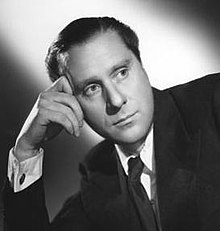Sir Carol Reed
| Sir Carol Reed | |
|---|---|
 |
|
| Born |
30 December 1906 Putney, London, England |
| Died | 25 April 1976 (aged 69) Chelsea, London, England |
| Occupation | Film director and producer |
| Years active | 1935–1972 |
| Spouse(s) | Diana Wynyard (1943–1947) Penelope Dudley-Ward (1948–1976; his death) |
Sir Carol Reed (30 December 1906 – 25 April 1976) was an English film director best known for Odd Man Out (1947), The Fallen Idol (1948) and The Third Man (1949). For Oliver! (1968), he received the Academy Award for Best Director.
Carol Reed was born in Putney, south-west London. He was the out-of-wedlock son of actor-producer Sir Herbert Beerbohm Tree and his mistress, May Pinney Reed. He was educated at The King's School, Canterbury.
He embarked on an acting career while still in his late teens. A period in the theatrical company of the thriller writer Edgar Wallace followed, and Reed became his personal assistant in 1927. Apart from acting in a few Wallace derived films himself, Reed became involved in adapting his work for the screen during the day while he was a stage manager in the evenings. The connection with Wallace ended with his death in Hollywood during February 1932. Taken on by Basil Dean, Reed worked for his Associated Talking Pictures, successively for ATP as a dialogue director, second-unit director and then assistant director. His films in the later role working under Dean were Autumn Crocus, Lorna Doone and Loyalties and (with Thorold Dickinson) Java Head.
His earliest films as director were "quota quickies". Of his experience making Midshipman Easy (1935) his first solo directorial project he was harsh on himself. "I was indefinite and indecisive", he said later. "I thought I had picked up a lot about cutting and camera angles, but now, when I had to make all the decisions myself and was not just mentally approving or criticising what somebody else decided, I was pretty much lost. Fortunately, I realised that this was the only way to learn – by making mistakes."Graham Greene, then reviewing films for The Spectator, was much more forgiving, commenting that Reed "has more sense of the cinema than most veteran British directors". Of Reed's comedy Laburnum Grove (1936), he wrote: "Here at last is an English film one can unreservedly praise". He was perceptive about Reed's potential, describing the film as "thoroughly workmanlike and unpretentious, with just the hint of a personal manner which makes one believe that Mr. Reed, when he gets the right script, will prove far more than efficient."
...
Wikipedia
